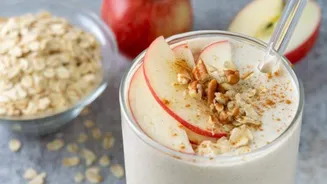Discover 10 Ways to Enhance Your Morning Coffee for a Healthier Routine. Elevate your daily cup and boost your well-being!
For many Indians, a steaming cup of coffee is the perfect start to the day. It's
that aromatic kick that gets us going, fuels our productivity, and sometimes, just makes the world seem a little brighter. But, are we making the most of our daily coffee ritual?

Or, are we inadvertently adding unhealthy elements that negate its potential benefits? Let’s explore 10 simple yet effective ways to transform your morning coffee from a mere habit into a health-boosting experience.
Choose Organic, Fair Trade Coffee
The first step towards a healthier coffee ritual is selecting the right beans. Opt for organic coffee whenever possible. This reduces your exposure to harmful pesticides and herbicides that are often used in conventional coffee farming.

Fair trade coffee ensures that farmers are paid a fair price for their beans, promoting sustainable farming practices and supporting communities. This not only benefits your health but also contributes to a more ethical and sustainable coffee industry. It’s a win-win!
Look for certifications like "Certified Organic" and "Fairtrade Certified" on the packaging. These labels assure you that the coffee meets specific standards for organic farming and fair trade practices.
By making this simple switch, you're making a conscious choice for your well-being and the well-being of others. Remember, the quality of your coffee beans directly impacts the quality of your coffee and its potential health benefits.
Investing in high-quality, ethically sourced coffee is an investment in yourself and the planet. So, take a moment to research and choose wisely – your taste buds and your body will thank you!
This small change can make a big difference in the long run, transforming your daily coffee ritual into a more wholesome and sustainable experience.
Ditch the Sugar, Embrace Natural Sweeteners
Sugar is a common culprit in many unhealthy coffee habits. It adds unnecessary calories, can lead to energy crashes, and contributes to various health problems like weight gain and increased risk of type 2 diabetes.

Instead of refined white sugar, explore natural alternatives like stevia, monk fruit sweetener, or a small amount of raw honey. These options are significantly lower in calories and have a lower impact on your blood sugar levels.
Stevia and monk fruit are particularly good choices as they are naturally derived and have virtually no calories. A drizzle of raw honey not only adds sweetness but also boasts antioxidant properties. However, remember that even natural sweeteners should be used sparingly.
The goal is to gradually reduce your dependence on sweetness altogether, allowing you to appreciate the natural flavors of the coffee itself. Experiment with different natural sweeteners to find your preferred taste and level of sweetness.
You might be surprised at how little you need to enhance the flavor of your coffee without the negative effects of sugar. By making this simple switch, you're significantly reducing your sugar intake and paving the way for a healthier coffee routine.
It's a small change that can have a big impact on your overall health and well-being. Moreover, reducing sugar can improve your energy levels throughout the day, prevent those afternoon slumps, and contribute to a more stable mood.
Say No to Artificial Creamers
Artificial creamers are often loaded with unhealthy ingredients like trans fats, artificial flavors, and additives. These ingredients can negatively impact your heart health and overall well-being.
A much better alternative is to use natural milk, like cow's milk (if you consume dairy) or plant-based milk such as almond milk, soy milk, or oat milk. These options provide a creamy texture and flavor without the harmful additives.
When choosing plant-based milk, opt for unsweetened varieties to avoid added sugars. You can also experiment with different ratios of milk to coffee to find the perfect balance for your taste.
Another healthy option is to add a splash of pure cream instead of artificial creamer, although do keep portion sizes small. If you want a truly healthy option, try drinking your coffee black! You might find that you enjoy the pure, unadulterated flavor of the coffee beans.
By swapping artificial creamers for natural alternatives, you're making a conscious choice to reduce your intake of unhealthy fats and additives. This simple change can contribute to a healthier heart, improved digestion, and a better overall sense of well-being.
Plus, you'll be enjoying the true flavors of your coffee without the artificial distractions.
Add a Dash of Cinnamon or Cocoa
Spices aren't just for cooking; they can also elevate your coffee experience and provide added health benefits. Cinnamon, for example, is known for its anti-inflammatory properties and its ability to help regulate blood sugar levels.

A dash of cinnamon in your coffee can add a warm, comforting flavor while potentially improving your health. Cocoa powder, specifically unsweetened cocoa powder, is another excellent addition. It's rich in antioxidants and can provide a subtle chocolate flavor without the added sugar.
Be sure to use pure cocoa powder, not instant hot chocolate mixes which are often loaded with sugar and artificial ingredients. Experiment with different amounts of cinnamon or cocoa to find your preferred taste. You can also combine them for a unique and flavorful coffee experience.
These spices not only enhance the flavor of your coffee but also provide a boost of antioxidants and potential health benefits. It's a simple and delicious way to make your morning cup a little bit healthier and more enjoyable.
Moreover, the aroma of cinnamon and cocoa can be incredibly comforting, helping to create a more relaxing and enjoyable coffee ritual. So, give it a try and see how these spices can transform your everyday coffee.
Control Your Caffeine Intake
While caffeine can provide a temporary boost in energy and focus, excessive consumption can lead to anxiety, insomnia, and other health problems. It's important to be mindful of your caffeine intake and to moderate your coffee consumption.

The recommended daily caffeine intake for most adults is around 400 milligrams, which is roughly equivalent to four cups of brewed coffee. However, individual sensitivity to caffeine can vary widely. Pay attention to how your body responds to coffee and adjust your consumption accordingly.
If you experience symptoms like anxiety, palpitations, or difficulty sleeping, consider reducing your caffeine intake. You can also try switching to decaf coffee for some of your daily cups. Decaf coffee still provides the flavor and aroma of coffee without the caffeine.
Avoid drinking coffee late in the afternoon or evening as it can interfere with your sleep. By being mindful of your caffeine intake, you can enjoy the benefits of coffee without the negative side effects. It's all about finding the right balance for your body and your lifestyle.
Remember, caffeine is a stimulant, and like any stimulant, it should be used responsibly.
Use a Paper Filter (or Go French Press)
The method of brewing your coffee can also impact its health benefits. Paper filters remove certain compounds from the coffee, including cafestol and kahweol, which have been linked to increased cholesterol levels. Using a paper filter can help to reduce your exposure to these compounds.
Alternatively, you can use a French press, which allows more of the natural oils and flavors to remain in the coffee. However, French press coffee also retains more of the cafestol and kahweol. The best method for you depends on your individual preferences and health concerns.
If you're concerned about cholesterol levels, using a paper filter is a good choice. If you prefer the richer, fuller flavor of French press coffee, you can moderate your consumption to minimize your exposure to cafestol and kahweol.
Experiment with different brewing methods to find the one that best suits your taste and health needs. Each method offers a unique coffee experience, and understanding the differences can help you make informed choices about your coffee ritual.
Ultimately, the goal is to enjoy your coffee in a way that is both satisfying and beneficial to your health.















